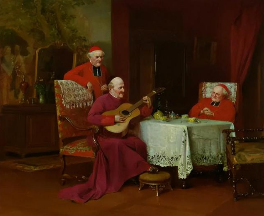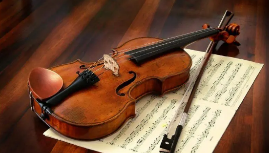Bach, the father of music, was the chosen worker?
7 min read
You may not have heard the minuet or the Brandenburg Concerto, but you must be familiar with the name of Bach, the father of classical music.His compositions amazed the Western world and continue to influence the music industry today.What is surprising, though, is that Bach was not a great artist at the time, not even a composer. Bach had multiple identities in his life.So what exactly was his role? How did he become the father of music?
01.Ecclesiastical musician.
At the end of the seventeenth century and the beginning of the eighteenth century, church and state were not completely separated in German society. At this time, the church was the government. Because the church enjoyed the right to distribute resources in society, many schools were church schools, and many social activities were organized by the church.
In addition, the church also hired musicians to compose and perform music for some ceremonies. Bach was originally a “church musician” for the church.
So how did Bach become a “God-chosen worker”? It starts with his life experience.
Bach was born in Germany in 1685. As he grew up, he attended a number of schools specializing in music. After graduation, he worked in various churches, such as Arnstadt, Weimar, Coten, and so on.
If you have ever traveled in Europe, you know that every place and every town has a church.
No matter how small the town is, a small European city with a few hundred or a few thousand people, it has a church of its own, and that church is a center of that town or that city.
This tradition had been perfected by the time Bach was born, which is why he worked in various places as a “musical servant” in the church.
So why do you call it a musical slave? It’s actually what we mean today when we say worker.
Bach would learn and compose whatever music the church needed. Whenever the church needed music, he was there to play it.
If the church needed a lot of people to perform or sing music, he would help teach them how to play and sing.
So Bach’s status in the church is not very high. At a time when church music was an important part of the service, he was the one person who was always on call, even needed.
His routine was to create music Monday through Friday and rehearse on Saturday.
Because he did not play many songs by himself, but needed many people to sing together or a small band to perform, so he had to copy some score after he finished composing the music from Monday to Friday.
He had to write and copy music, rehearse with the musicians on Saturdays, and worship God in the Christian tradition on Sundays.
Therefore, Bach did not rest from Monday to Sunday, basically 365 days busy work.
At 38, however, Bach reached a turning point in his life. Because of his impressive musical talent, he was hired as music director of St. Thomas Church in Leipzig, Germany.
It sounds like a high level position, but he just moved to a new church and continued to write and perform music.
During his work in the church, Bach created 200 religious oratorios and 200 organ hymns, as well as a series of religious works such as the passion, the Nativity play, which were used on every fixed occasion and date of every week or every year.
His repertoire also reflects the nature of his work.
Although Bach only played the role of “musical servant” in every church, he was already a qualified church musician when it came to composing music.
02.Secular musician.
Of course, Bach was not entirely a church musician. Many of his works had nothing to do with religion, because he also had another identity, that is, a church school teacher.
In the late 17th and early 18th centuries, the church of St. Thomas in Leipzig, where Bach worked, had a number of ancillary schools where he needed to train the next generation of ritual musicians.
So in these church schools, he did a lot of exercises and taught some of the textbook works. His 24 preludes and fugues, for example, are also known as the twelve equal temperament.
He also wrote many unaccompanied works, including six suites for unaccompanied violin, several suites for unaccompanied cello, and some preludes and fugues for organ, which Bach used in school.
Bach’s salary was not very high, however, and he sometimes went out to earn extra money.
For example, at some aristocratic banquet, or on a birthday, he would play some music, and for some important ceremony, he would compose some music.
Bach is recorded as complaining that not enough people were dying to sell his music.
This kind of music for the entertainment of the aristocracy was called secular music, and the people who composed it were called “secular musicians,” and Bach was clearly one of them.
The chaconne, Sarabande, minuet and so on in his suite for violin a cappella are all familiar secular music.
Minuet is created for some aristocracies to hold a ball, these aristocracies are to follow the rhythm of the music to start their own steps, they are generally very elegant to dance, the strides are very small, hence the name minuet.
Bach also wrote a set of six Brandenburg Concertos, which were for orchestras and were also secular music. Why is it called the Brandenburg Concerto?
This is because Bach went to a small town in Germany called Brandenburg. One of the mayors of that town, or one of the prefectures, invited Bach to make some music for them, so Bach went there and made six Brandenburg Concertos.
From this we can know that Bach also created a lot of secular music in his life, which is enough to prove that he is still a “secular musician”.
03.The father of classical music.
Bach was a musical worker, a church musician, a secular musician, but we must not forget that he was also the father of Western classical music.
So how did he become the father of music?
We know that the music of the church was not listened to repeatedly, it was changed every week, so most of this music was not heard by later generations, but modern people often hear Bach’s music, and that’s because of one man, Mendelssohn, who was a composer in the early nineteenth century.
Mendelssohn dug up some Bach manuscripts in a church in Leipzig. When he saw the manuscripts, he realized that Bach’s music was so beautiful. Then he copied the Bach scores again and began to perform them in churches.
Bach’s music, which had lain dormant for 100 years after his death, was heard again.
It happened that in the Romantic period at that time, people attached great importance to the pursuit of spirit and yearned for classical art. Therefore, after hearing Bach’s music, people believed that Bach’s music was a kind of music with beauty and wisdom.
Bach’s music, then, has been performed repeatedly since Mendelssohn in the early 19th century.
However, he is known as the father of music not only because his music predated and survived the popular music of Haydn and Mozart, but also because of his contribution to the tonal reform.
In the previous western music industry, most composers were mainly composed in C major, G major and F major.
Because the tuning system at the time was that the 12 notes were not evenly distributed, which meant that when we played C major, we sounded good, and G major sounded good.
But if we play some semitones as tonic, which is the semitone when we say do, it sounds bad. So, that was a big limitation at the time.
So Bach made use of the twelve equal temperament we mentioned earlier to create a very important set of works called the 24 prelude and fugue. So, what is the law of twelve equals?
If you look at a piano keyboard, how many different notes are there from this C to a C octave higher or a do, from a low do to a high do?
If we count them, there are twelve different notes, which is seven white keys plus five black keys.
Twelve different keys, each of which has a major and a minor key, Bach’s 24 preludes and fugues are equivalent to composing a piece in every possible key on the piano or in music, which is called the twelve equal temperament.
Remarkably, he was the first composer to write a piece in all 24 keys. So Bach had a very profound influence on the tonal reform.Among the 24 preludes and fugues, the one you are most familiar with is the first one. Many people have adapted it into different melodies, or used it in different situations and occasions.Bach, therefore, not only left behind beautiful music and revolutionary innovations in musical tuning, but also gave the music world hope for continuous development.






